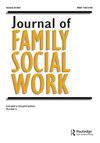Relationship between caregiver burden and basic and instrumental activities of daily living among compound and noncompound caregivers
IF 0.7
Q3 SOCIAL WORK
引用次数: 7
Abstract
ABSTRACT Parental caregivers can expect to support their children with autism spectrum disorder (ASD) across the lifespan. Providing ongoing support for adult children with ASD who have difficulty performing activities of daily living (ADLs) independently can increase caregiver burden. This may be particularly challenging for compound caregivers (caring for at least one adult child with ASD and another care recipient). The present study investigated differences in relationships between caregiver burden and basic ADLs (BADLs) and instrumental ADLs (IADLs) between compound and noncompound caregivers. Using a nonexperimental correlational research design, 320 parental caregivers of adults with ASD completed a web-based survey. The quantitative analysis compared compound and noncompound caregivers on relationships between caregiver burden and ability to perform ADLs independently. Differences for caregiver burden, BADLs, and IADLs between compound and noncompound caregivers were statistically significant. However, comparison of correlations of caregiver burden and ADLs between the two groups was not significant. These findings provided support that caregiver burden was negatively impacted by the lack of independence in functional ability of their care recipients with ASD for both groups. Social workers and other professionals should offer relevant interventions, supports, and services that benefit compound and noncompound caregivers and their adult children with ASD.复合型和非复合型照顾者照顾负担与基本和工具性日常生活活动的关系
摘要父母照顾者可以期望在其患有自闭症谱系障碍(ASD)的孩子的一生中为其提供支持。为难以独立进行日常生活活动的ASD成年儿童提供持续支持可能会增加照顾者的负担。这对复合照顾者(至少照顾一名患有自闭症的成年儿童和另一名受照顾者)来说可能特别具有挑战性。本研究调查了复合照顾者和非复合照顾者之间照顾者负担与基本日常生活能力(BADL)和工具性日常生活能力之间的关系差异。采用非实验相关研究设计,320名ASD成年人的父母照顾者完成了一项基于网络的调查。定量分析比较了复合护理人员和非复合护理人员在护理人员负担和独立进行日常生活能力之间的关系。复合护理人员和非复合护理人员在护理人员负担、BADL和IADL方面的差异具有统计学意义。然而,两组之间照顾者负担和ADL的相关性比较并不显著。这些发现支持了护理人员负担受到两组ASD护理对象功能能力缺乏独立性的负面影响。社会工作者和其他专业人员应提供相关干预、支持和服务,使复合和非复合照顾者及其患有自闭症的成年子女受益。
本文章由计算机程序翻译,如有差异,请以英文原文为准。
求助全文
约1分钟内获得全文
求助全文
来源期刊

Journal of Family Social Work
SOCIAL WORK-
CiteScore
2.10
自引率
0.00%
发文量
4
期刊介绍:
Each issue of the Journal of Family Social Work contains peer reviewed research articles, conceptual and practice articles, creative works, letters to the editor, and book reviews devoted to innovative family theory and practice subjects. In celebrating social workers" tradition of working with couples and families in their life context, the Journal of Family Social Work features articles which advance the capacity of practitioners to integrate research, theory building, and practice wisdom into their services to families. It is a journal of policy, clinical practice, and research directed to the needs of social workers working with couples and families.
 求助内容:
求助内容: 应助结果提醒方式:
应助结果提醒方式:


